| Cesina | |
|---|---|
| Country | Principality of Capua Principality of Salerno |
| Current region | |
| Place of origin | Kingdom of the Lombards Duchy of Benevento |
| Founded | 665 |
| Connected families | Frezza |
The Cesina family is an Italian family of Roman-Lombard origin.
Origins
The Cesina family takes its surname from the fiefdom, being vassals of the Lombard dukes of Duchy of Benevento.
Initially, the fiefdom was a wooded area designated for woodcutting and later converted into an agricultural field, formed in 664 as a reward to the vassal by the Lombard king Grimoald, King of Italy.[1][2]
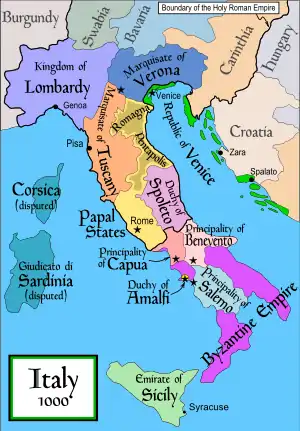

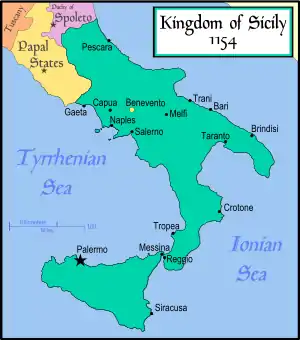
The fiefdom Cesina was originally included in the gastaldate of Aquino,[3] which controlled the entire territory of Cassino, and it had considerable strategic importance in guarding the borders of the Duchy of Benevento. The vassals preserved the fief for the dukes and then princes of Benevento, until 883, when the territory was devastated from the arrival of the Saracens, who came from Agropoli at the invitation of Docibilis I, Duke of Gaeta, who destroyed the Abbey of Montecassino. The survivors took refuge in Presenzano. After the Battle of Garigliano, in 915, the fiefdom was included to the Principality of Capua.
In 1019, the fiefdom was claimed by Abbot of Montecassino Atenulf[4] who requested its restitution from his brother, the Lombard prince Pandulf IV of Capua.[5][6]
With the end of the Lombard domains in Italy in 1077, conquered by the Normans, under the leadership of the famous Robert Guiscard, and added to their County of Sicily, the fiefdom entered the possession of the Di Sangro family, heirs of the Counts of Marsi.[7]

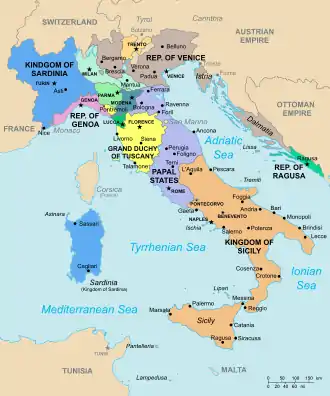
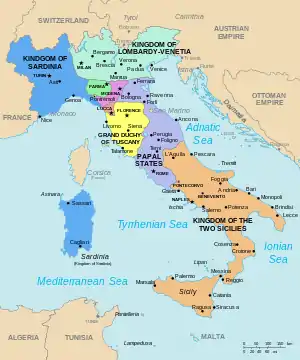
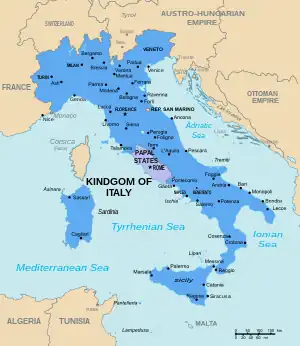
Notable members
- Giuseppe Cesina, Secretary of Kingdom of Sicily from 1678 to 1688, at service Viceroys of Sicily, under King Charles II of Spain.[8]
- Giovanni Giacomo Cesina, born in Bosco, Principato Citra, Kingdom of Naples, Doctor of Law, 1724[9]
- Eugenio Cesina, Assessor of Venice, Kingdom of Lombardy–Venetia in 1848, witness of the interrogation in prison of the Italian patriot Daniele Manin.[10]
Family tree
| Cesina Family | |||||||||||||||||||||||||||||||||||||||||||||||||||||||||||||||||||||||||||||||||||||||||||||||||||||||||||||||||||||||||||||||||||||||||||||||||||||||||||||||||||||||||||||||||||||||||||||||||||||||||||||||||||||||||||||||||||||||||||||||||||||||||||||||||||||||||||||||||||||||||||||||||||||||||||||||||||||||||||||||||||||||||||||||||||||||||||||||||||||||||||||||||||||||||||||||||||||||||||||||||||||||||||||||||||||||||||||||||||||||||||||||||||||||||||||||||||||||||||||||||||||||||||||||||||||||||||||||||||||||||||||||||||||||||||||||||||||||||||||||||||||||||||||||||||||||||||||||||||||||||||||||||||||||||||||||||||||||||||||||||||||||||||||||||||||||||||||||||||||||||||||||||||||||||||||||||||||||||||||||||||||||||||||||||||||||||||||||||||||||||||||||||||||||||||||||||||||||||||||||||||||||||||
|---|---|---|---|---|---|---|---|---|---|---|---|---|---|---|---|---|---|---|---|---|---|---|---|---|---|---|---|---|---|---|---|---|---|---|---|---|---|---|---|---|---|---|---|---|---|---|---|---|---|---|---|---|---|---|---|---|---|---|---|---|---|---|---|---|---|---|---|---|---|---|---|---|---|---|---|---|---|---|---|---|---|---|---|---|---|---|---|---|---|---|---|---|---|---|---|---|---|---|---|---|---|---|---|---|---|---|---|---|---|---|---|---|---|---|---|---|---|---|---|---|---|---|---|---|---|---|---|---|---|---|---|---|---|---|---|---|---|---|---|---|---|---|---|---|---|---|---|---|---|---|---|---|---|---|---|---|---|---|---|---|---|---|---|---|---|---|---|---|---|---|---|---|---|---|---|---|---|---|---|---|---|---|---|---|---|---|---|---|---|---|---|---|---|---|---|---|---|---|---|---|---|---|---|---|---|---|---|---|---|---|---|---|---|---|---|---|---|---|---|---|---|---|---|---|---|---|---|---|---|---|---|---|---|---|---|---|---|---|---|---|---|---|---|---|---|---|---|---|---|---|---|---|---|---|---|---|---|---|---|---|---|---|---|---|---|---|---|---|---|---|---|---|---|---|---|---|---|---|---|---|---|---|---|---|---|---|---|---|---|---|---|---|---|---|---|---|---|---|---|---|---|---|---|---|---|---|---|---|---|---|---|---|---|---|---|---|---|---|---|---|---|---|---|---|---|---|---|---|---|---|---|---|---|---|---|---|---|---|---|---|---|---|---|---|---|---|---|---|---|---|---|---|---|---|---|---|---|---|---|---|---|---|---|---|---|---|---|---|---|---|---|---|---|---|---|---|---|---|---|---|---|---|---|---|---|---|---|---|---|---|---|---|---|---|---|---|---|---|---|---|---|---|---|---|---|---|---|---|---|---|---|---|---|---|---|---|---|---|---|---|---|---|---|---|---|---|---|---|---|---|---|---|---|---|---|---|---|---|---|---|---|---|---|---|---|---|---|---|---|---|---|---|---|---|---|---|---|---|---|---|---|---|---|---|---|---|---|---|---|---|---|---|---|---|---|---|---|---|---|---|---|---|---|---|---|---|---|---|---|---|---|---|---|---|---|---|---|---|---|---|---|---|---|---|---|---|---|---|---|---|---|---|---|---|---|---|---|---|---|---|---|---|---|---|---|---|---|---|---|---|---|---|---|---|---|---|---|---|---|---|---|---|---|---|---|---|---|---|---|---|---|---|---|---|---|---|---|---|---|---|---|---|---|---|---|---|---|---|---|---|---|---|---|---|---|---|---|---|---|---|---|---|---|---|---|---|---|---|---|---|---|---|---|---|---|---|---|---|---|---|---|---|---|---|---|---|---|---|---|---|---|---|---|---|---|---|---|---|---|---|---|---|---|---|---|---|---|---|---|---|---|---|---|---|---|---|---|---|---|---|---|---|---|---|---|---|---|---|---|---|---|---|---|---|---|---|---|---|---|---|---|---|---|---|---|---|---|---|---|---|---|---|---|---|---|---|---|---|---|---|---|---|---|---|---|---|---|---|---|---|---|---|---|---|---|---|---|---|---|---|---|---|---|---|---|---|---|---|---|---|---|---|---|---|---|---|---|---|---|---|---|---|---|---|---|---|---|---|---|---|---|---|---|---|---|---|---|---|---|---|---|---|---|---|---|---|---|---|---|---|---|---|---|---|---|---|---|---|---|---|---|---|---|---|---|---|---|---|---|---|---|---|---|---|---|---|---|---|---|---|---|---|---|---|---|---|---|---|---|---|---|---|---|---|---|---|---|---|---|---|---|---|---|---|---|---|---|---|---|---|---|
| |||||||||||||||||||||||||||||||||||||||||||||||||||||||||||||||||||||||||||||||||||||||||||||||||||||||||||||||||||||||||||||||||||||||||||||||||||||||||||||||||||||||||||||||||||||||||||||||||||||||||||||||||||||||||||||||||||||||||||||||||||||||||||||||||||||||||||||||||||||||||||||||||||||||||||||||||||||||||||||||||||||||||||||||||||||||||||||||||||||||||||||||||||||||||||||||||||||||||||||||||||||||||||||||||||||||||||||||||||||||||||||||||||||||||||||||||||||||||||||||||||||||||||||||||||||||||||||||||||||||||||||||||||||||||||||||||||||||||||||||||||||||||||||||||||||||||||||||||||||||||||||||||||||||||||||||||||||||||||||||||||||||||||||||||||||||||||||||||||||||||||||||||||||||||||||||||||||||||||||||||||||||||||||||||||||||||||||||||||||||||||||||||||||||||||||||||||||||||||||||||||||||||||
See also
References
- ↑ "GRIMOALDO, re dei Longobardi". treccani.it. treccani.it. Retrieved 12 November 2020.
- ↑ Abate Alessandro di Meo (1819). Annali Critico-Diplomatici Del Regno Di Napoli Della Mezzana Età: Che contiene gl'indici, monastico, e topografico, Tomo 12. Napoli: Stamperia Simoniana. p. 520. Retrieved 13 November 2020.
- ↑ "AQUINO". treccani.it. treccani.it. Retrieved 14 November 2020.
- ↑ "ATENOLFO". treccani.it. treccani.it. Retrieved 15 November 2020.
- ↑ "MONTECASSINO". treccani.it. treccani.it. Retrieved 12 November 2020.
- ↑ Teano Sidicino antico e moderno del decano Michele Broccoli. Napoli. 1822.
- ↑ Memorie delle Famiglie Nobili delle Province Meridionali d'Italia (Volume 3). Berardo Candida Gonzaga, Count. 1876. Retrieved 2 August 2020.
- ↑ "Soprintendenza Archivistica della Sicilia Archivio di Stato di Palermo Segretari del Regno Ramo Protonotaro1500-1794707 bb., voll.n. 27 E" (PDF). saassipa.beniculturali.it. Soprintendenza Archivistica della Sicilia – Archivio di Stato. Retrieved 12 March 2021.
- ↑ "Cesina Giovanni Giacomo, nato a Bosco - Principato Citra, facoltà : Legge, 1724". archiviodistatonapoli.it. archiviodistatonapoli.it. Archived from the original on 23 January 2022. Retrieved 23 January 2022.
- ↑ Errera, Alberto. "La vita e i tempi di Daniele Manin, narrazione dei Prof. Alberto Errera e Avv. Cesane Finzi corredata dai documenti inediti depositati nel Museo Correr dal Generale Giorgio Manin ( 1872 )". opacplus.bsb-muenchen.de. Venezia Tipografia Antonelli 1872. Retrieved 18 November 2020.
Bibliography
- Berardo Candida Gonzaga, Count, Memorie delle famiglie nobili delle province meridionali d'Italia, vol. 1 e 6, Bologna, Arnaldo Forni Editore, 1875.